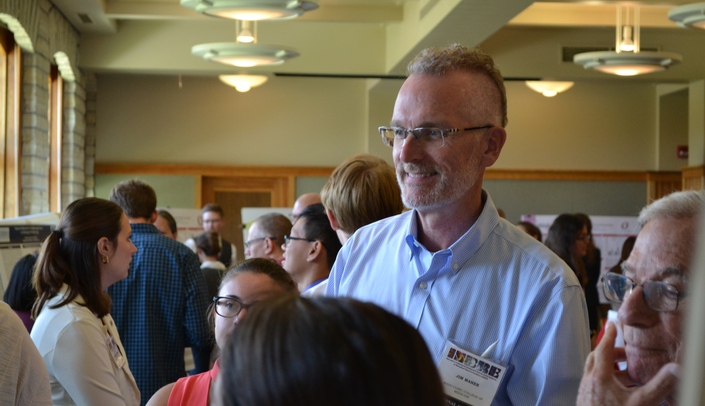Promoting careers in biomedical research is one of Jim Maher, Ph.D.'s passions.
So, when the dean of the Mayo Clinic Graduate School of Biomedical Sciences got the chance to join the NE-INBRE program as an external advisory committee member, he jumped at the opportunity.
The emphasis on the students of the NE-INBRE program appealed to him most of all.
"The NE-INBRE proves that it doesn’t matter where a student comes from but their success lies in the opportunities they are given. This program makes sure students from a wide variety of backgrounds experience the same opportunities to succeed," Dr. Maher said.
Dr. Maher has always worked with students in his lab, encouraging their discovery, supporting their research efforts and, in recent times, learning about the latest trends in pop culture.
"The students keep me young," he said.
For the past 25 years, Dr. Maher has focused his research on studying three problems: the origin and biological management of DNA stiffness; combinatorial selection of folded DNA and RNA molecules; and unusual cancers that are caused by defects in cell metabolism.
Dr. Maher graduated from the University of Wisconsin at Madison with a doctoral degree in molecular biology in 1988. He completed his post-doctoral training at the California Institute of Technology and began his career at UNMC as a faculty member in the Eppley Institute in 1991 before moving to Mayo in 1995.
While at UNMC, he mentored Julie Soukup, Ph.D., who worked in his lab as a graduate student, and the two stayed in touch over the years.
Describing her time as a graduate student in Dr. Maher’s lab, Dr. Soukup said, "I won the science lottery. In his lab I learned how to be a scientist – including how to write, communicate, design experiments, and analyze data. But just as important, I learned how to be a mentor – how to teach and support and motivate developing scientists."
It was Dr. Soukup, who would later join the NE-INBRE program as a faculty associate and is now program coordinator for the primarily undergraduate institutions within the NE-INBRE program, who invited Dr. Maher to join the external advisory committee.
"When we needed a new INBRE External Advisory Board member, Jim was the first person I thought of," Dr. Soukp said.
"He LOVES science, is highly respected in his area of research, is always engaged with students and faculty, and is an amazing role model for the INBRE Scholars and faculty."
"It’s one of the most, well-thought out programs," Dr. Maher said of the NE-INBRE.
He is particularly impressed with the caliber of students who take part in the program, whom he described as "highly enthusiastic, bright and energetic."
"It was cool to see two former scholars return to speak at the annual meeting and hear about their interesting careers that were different from academic professorships in grant-funded biomedical research labs. This really showed how far biomedical research training can take you," Dr. Maher said.
Nebraska, he said, should be very proud of its NE-INBRE program.
